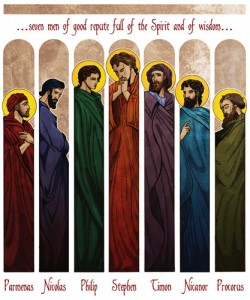 Not long ago my family and I were strolling along a crowded street in San Francisco’s Chinatown. As we approached a group of very strange-looking Goths, my kids began to show signs of fear. My five-year-old instantly gripped my hand more tightly. My ten-year-old son drew close to me and started whispering about his worries. My twelve-year-old daughter grabbed my wife’s arm. By the looks on their faces, my kids thought we were in imminent peril.
Not long ago my family and I were strolling along a crowded street in San Francisco’s Chinatown. As we approached a group of very strange-looking Goths, my kids began to show signs of fear. My five-year-old instantly gripped my hand more tightly. My ten-year-old son drew close to me and started whispering about his worries. My twelve-year-old daughter grabbed my wife’s arm. By the looks on their faces, my kids thought we were in imminent peril.
In reality, there was no danger. We were entirely safe. My kids were just experiencing the effects of classic xenophobia. But they were just kids. And kids get scared of all kinds of things.
When we reached a quieter corner, I took my children aside and imparted some words of wisdom: “If we’re ever in a situation where you think we might be in danger, I want you to look at me. If I’m calm, then you can relax. But if I’m scared, then you can be scared, too.”
That non-event in Chinatown that caused my children such stress illustrates an important principle that applies not only to the family, but also to the family of God. In families, parents have experience and perspective kids can’t possibly have. They’re able to size up situations more quickly and thoroughly than children. That’s why parents need to set the tone for an appropriate response to merely perceived (as well as real) dangers.
The same is true for leaders in the Christian community in their responses to critics of Christianity.
Typical Responses to Critics of Christianity
In our era of new media—blogs, websites, Twitter, and Facebook—critics can quickly and easily make unsubstantiated or less-than-substantiated claims against the Bible or Jesus or the history of the faith. And many—both unbelievers and believers—take these claims seriously. When a perceived threat to the faith hits the public square . . . when another credentialed critic slams Jesus . . . or when some new scientific or historical discovery challenges the Bible, the pastors and teachers of the church often tune their responses to the same frequency as those critics who sounded the exaggerated alarm. Yet the Christian’s answers are often just as hasty (and just as irresponsible) as those of their non-Christian opponents. Too frequently they treat a cat’s hiss like a lion’s roar then respond with a tranquilizer gun that could take down a brontosaurus.
But what choice do Christian leaders have? How else should we respond to news that rattles the cage of a skittish Christian community?
The common approach today is to respond instantly to every criticism: Be ready to have an answer for every challenge. If somebody emails us for a quote, we need to be prepared to say something. If the news asks us for an interview, we must take that opportunity to set the record straight. If the cameras show up for a comment, we should have our makeup in hand. Why? Because Christians need to “be ready in season and out of season” (2 Tim. 4:2), “always being prepared to make a defense to anyone who asks” (1 Pet. 3:25). This is the apologetic approach of the modern media age. At one level the reasoning makes sense: if we don’t answer, people will think we don’t have an answer—not only our critics, but also those believers whose spiritual safety is our responsibility.
Now, I have no intention of criticizing this approach in its entirety. This kind of readiness and willingness to take opportunities to respond to critics has been part of the Christian faith for centuries. And Christian leaders ought to take advantage of opportunities to clear the air of controversy and calm the hearts of those with fragile faith. Yet my contention is that this is not the only Christian method of responding to critics . . . nor is it always the wisest.
In this essay, I want to suggest a different approach—less popular today, but no less Christian.
The Silence of the Bishop
Around the year A.D. 110, while under arrest and on his way to Rome to be fed to the lions, Ignatius of Antioch wrote a handful of letters to several churches in Asia Minor warning them of false teachers and urging them to faithfully contend for the faith once for all delivered to the saints. Apparently, though, the bishops of Ephesus and Philadelphia were not known for a strategy of vocal debate with false teachers and critics. In fact, it seems that some in their churches were even disappointed by their bishops’ strategy of keeping silent instead of debating their critics in the public square.
Rather than chastising those pastors for failing to arm themselves for disputation and to meet their opponents at high noon for a public shoot-out, Ignatius actually praised their refusal to engage in doctrinal battle royal. To the church in Ephesus he wrote: “The more anyone observes that the bishop is silent, the more one should fear him” (Ign. Eph. 6.1). Similarly, concerning the bishop of the Philadelphian church, Ignatius wrote, “I am impressed by his forbearance; he accomplishes more through silence than others do by talking” (Ign. Phld. 1.1).
Scholars have gone back and forth on exactly what Ignatius meant by praising the silence of the bishop. However, by placing Ignatius’s commendations in their Hellenistic rhetorical context, Harry O. Maier concludes, “Ignatius’ praise of silent bishops is not an attempt to defend ineloquence, nor is it intended to urge circumspection in theological debate; still less is it evidence in the first instance of the cosmological theorizing of a speculative theologian. Rather, it represents an idiosyncratic treatment of a commonplace in ancient rhetorical art concerning the discipline of well-timed and temperate speech that accomplishes important tasks of promoting social harmony and civil good order” (Harry O. Maier, “The Politics of the Silent Bishop: Silence and Persuasion in Ignatius of Antioch,” Journal of Theological Studies, NS, 55.2 [2004]: 506). For Ignatius of Antioch, the silence of the bishop meant “the opposite of intemperate speech and as such connotes the well-deployed rhetorical ability of the virtuous who have trained themselves to use the right word at the right time to achieve the common good” (Maier, “Silent Bishop,” 506).
Ignatius and the wise bishops of Asia Minor avoided mimicking the empty chatter of their foolish detractors. The heretical false teachers were talkative, impulsive, loquacious babblers. In response, the wise Christian leader should be cool, temperate, self-controlled, thoughtful, moderate, and well-reasoned, keeping silent in the face of opponents’ ceaseless prattling . . . but speaking calmly, cautiously, and controlled at the proper time and in the proper tone (cf. Maier, “Silent Bishops,” 507–509).
Answering a Fool according to His Folly
In today’s culture of information overload, public debate, blog posts, podcasts, talking points, sound bites, tweets, and re-tweets, the ancient Christian virtue of remaining silent in the face of hurricanic hullabaloo seems more like a vice. Instead, when a scholar touts some new discovery as a challenge to the faith, many Christian leaders feel compelled to respond immediately . . . as if the discovery actually constituted a legitimate and dangerous challenge to the faith. But is this the wisest approach? Is meeting the unfounded alarm with equal panic a healthy path toward engaging the shrill detractors and critics in a hostile culture?
The book of Proverbs states two apparently contradictory perspectives on engaging the fool’s folly. The first: “Answer not a fool according to his folly, lest you be like him yourself” (Prov. 26:4). In other words, when we respond to fools in a way that stoops to their methods, reasoning, manner, and tone, we will appear to be just as foolish as the fool himself. Yet the very next line shines light from a different angle: “Answer a fool according to his folly, lest he be wise in his own eyes” (26:5). Without lowering ourselves to the manner of a fool (26:4), wisdom often demands that we respond appropriately when such a response will likely lead to the successful censure of the wiseacre. These verses need to be understood in light of their intended results: when answering a fool will result in folly, we should remain silent (26:4). But when answering a fool appropriately will lead to a correction of the fool’s self-estimation, we should instruct him (26:5).
This kind of calm, cautious, and controlled response seems to be in view in Peter’s classic “apologetics” passage, where that apostle writes, “In your hearts honor Christ the Lord as holy, always being prepared to make a defense to anyone who asks you for a reason for the hope that is in you; yet do it with gentleness and respect” (1 Pet. 3:15). This passage implies that the person is making a genuine inquiry concerning the devoted believer’s Christian hope; he’s not an arrogant scoffer engaged in a public smear campaign. The manner of response should be with the virtues of “gentleness and respect.” Similarly, Paul instructed Timothy to “be ready in season and out of season; reprove, rebuke, and exhort, with complete patience and teaching” (2 Tim. 4:2). Rather than shying away from genuine teaching opportunities, the faithful pastor or teacher should patiently engage in instruction.
This virtuous approach to engagement in the public square requires that we speak when it’s appropriate to speak . . . and that we be silent when we should be silent. It means we refuse to match the shrill tone of excitable detractors. We evade escalating polemics. We avoid being dragged into flash-in-the-pan controversies that will burn themselves out. It means that we know when to open our mouths and gently but firmly answer the fool who thinks he’s wise in his own eyes . . . and when to shake the dust off our feet, refuse to give holy things to the dogs, and avoid casting pearls to pigs (Matt. 7:6; 10:14).
When we look to the Lord Jesus for examples of responding to questioners and critics, we find that Christ displayed unpredictable and varied approaches, too. If He perceived that the challenges were inspired by wicked or disingenuous motives, He would simply refuse to answer them (Matt. 21:24; John 8:3–9). When the disciples asked an honest (though confused) question about His second coming and the destruction of Jerusalem, He not only answered their own question, but He also addressed bigger issues that should have concerned them (Matt. 24:1–51). Sometimes Jesus answered simple, honest questions with simple, straightforward responses (Mark 12:29–31; John 4:19–24). At other times He simply remained silent (Matt. 26:63; John 18:9). Overall, Jesus exemplified the kind of calm, cautious, and controlled engagement with questioners and critics we might expect from the One Who is Wisdom incarnate.
Accomplishing More . . . through Silence?
After that brief encounter with a group of Goths in Chinatown, I told my children, “If we’re ever in a situation where you think we might be in danger, I want you to look at me. If I’m calm, then you can relax. But if I’m scared, then you can be scared, too.”
In our age of religious, social, political, and cultural attacks on the Christian faith, Christian leaders can’t afford to get seduced into responding to constant potshots. As Ignatius of Antioch taught us, there’s something virtuous about the calm, collected, “silence of the bishop” in the midst of a barrage of enemy fire. There’s something to be said about a Christian leader’s cool approach to critics’ outrageous claims and scholars irresponsible assertions—an approach that rises above the fray, shrugs off the flack, and communicates to younger believers that ultimately no weapon formed against us will prosper (Isa. 54:17).
However, when we leaders behave like every volley in the so-called “culture war” needs to be met with an immediate and decisive retaliation, we may be inadvertently communicating to our people that we’re in constant danger of imminent decimation. Rank and file Christians might begin to believe that if we don’t have an instant answer to every foolish attack on the ancient faith, then the faith itself will be in danger of losing.
Of course, there will always be a contingent of Christian apologists and scholars out there engaged in a failed modernist exercise of “understanding seeking faith.” Deep down they hide their belief that some terrible misunderstanding, unanticipated piece of damning evidence, or cleverly articulated argument could potentially topple the faith once for all delivered to the saints.
However, in a classic Christian approach of “faith seeking understanding,” whether criticisms come in drizzles or downpours, trickles or typhoons, we will not be shaken (Ps. 62:2). To some our unwillingness to answer the fool according to his folly will look like an inability to put the scoffer in his place. But I believe the calm, cautious, and controlled Christian leader is a much greater boon to the Body of Christ than the half-cocked “hero” who is always itching to jump into the fray. I agree with the words of Ignatius of Antioch, that often the silent bishop “accomplishes more through silence than others do by talking” (Ign. Phld. 1.1).




